Originally published on 17th March 2020 Last updated on 3rd February 2022
Many of us with health conditions such as hypothyroidism, an underactive thyroid and/or Hashimoto’s, dream of becoming parents one day. I hear from other thyroid patients every day who are understandably worried or anxious about whether they’ll be able to conceive and have a healthy pregnancy.
The vast majority of us are able to have biological children and carry them healthily, but this can depend on how well our thyroid health is managed and what our health is like at the time of trying to conceive.

Thankfully, when I tried to conceive again fourteen months after the miscarriage, in 2019, and with my health in the best place it had ever been, thanks to implementing the below things, I fell pregnant immediately once more and this time it stuck. (When I also tried to conceive again in 2021, I fell pregnant immediately once more, as I revisited the below things in order to optimise this.)
It’s important to say however, that we don’t always know the reason behind a miscarriage and blaming ourselves often isn’t helpful in healing from the unfortunate experience of one. However, preparing your body as much as possible can certainly help to optimise the chances of a healthy conception and pregnancy with thyroid disease.
As I say often, every person is unique and individual, and so our needs and requirements can be unique to us as well. I have detailed below what I personally did to get my health in the best place possible before I tried to conceive again, but some of these may not apply to you, or conversely, you may have other things to explore and address that I did not.
A Preconception Plan
It is generally recommended that any woman wanting to fall pregnant has a ‘preconception plan’. What does this mean?
A preconception plan is simply when you plan for your pregnancy several months before actually trying to fall pregnant, getting all your ducks in a row and your health to optimal heights, ensuring you are in the best health to begin your pregnancy.
It was recommended to me that I prepare my body for a minimum of six months, before trying to fall pregnant again, as the egg released in each cycle generally takes this long to mature. And by doing this, meant I optimised the quality of the egg being fertilised. You increase your chances of getting pregnant if both you and your partner are in good health and have taken steps to ensure this.
I also read a lot before getting pregnant. Books I found particularly useful included:
The Thyroid Hormone Breakthrough: Overcoming Sexual and Hormonal Problems at Every Age
What I Did to Optimise Conceiving With Hashimoto’s and Hypothyroidism
1. I Got Thyroid Antibodies as Low as Possible (In Remission)
When to start a family is a very personal decision, but I knew I wanted to seize the opportunity when my Hashimoto’s reached the point of remission and I felt as well as possible, in order to support my body through pregnancy and post-pregnancy.
Although many of you reading this won’t know, 90% of us with hypothyroidism have Hashimoto’s. [1]
Hashimoto’s is the autoimmune disease that causes hypothyroidism in most cases, and managing the Hashimoto’s can be just as important as managing the hypothyroidism.
Related Article: Why It’s Important to Know if You Have Hashimoto’s
What Does Being in Remission Mean?
Simply put, the word ‘remission’ refers to a reduction of the severity of a disease. When it comes to Hashimoto’s, remission is characterised by the thyroid antibodies Thyroid Peroxidase and Thyroglobulin either being at zero or within normal ranges, as this typically means that the Hashimoto’s is well-controlled and managed, due to the attack and destruction of the thyroid gland either halted or slowed down significantly.
I documented everything I did to get my Hashimoto’s in to remission here. It included going gluten-free, taking Selenium and Vitamin D supplements, balancing my blood sugar and lowering high cortisol levels (more on that below).
Managing thyroid antibodies in pregnancy can be of importance, as experts state that thyroid antibodies cross the human placenta and could attack the baby’s thyroid gland. Research has also shown that high levels of Thyroid Peroxidase Antibodies in particular can increase the risk of premature births. So keeping Hashimoto’s well controlled for a healthy pregnancy can be crucial. [2]
Where Can I Order Thyroid Antibody Testing From?
If you’ve never had Hashimoto’s confirmed, or need to check where your thyroid antibody levels currently are, your doctor may be happy to run these tests for you. However, there are other options if not.
In The UK, Medichecks is a very popular choice. Their test kit is designed so that you can obtain a blood sample from yourself in the comfort of your own home via a finger prick and then put it back in to the post. Results come back within two days. You can order thyroid antibody testing to check for Hashimoto’s or monitor how your numbers change over time.
Worldwide, you can order via LetsGetChecked, who also offer thyroid antibody testing from their website too.
2. I Optimised My TSH, Free T3 and Free T4 Levels
Thyroid hormones directly affect the uterine lining, causing infertility or miscarriages to occur when they are abnormal. As well as complications during pregnancy, some women with low thyroid levels may even struggle to fall pregnant at all.
A recent study found that among women with diminished ovarian reserve or unexplained infertility, low Free T3 levels and positive thyroid antibodies (TPOAB) are associated with low antral follicle count. [3]
Ensuring not only that you are having the full thyroid panel tested (and not just TSH), as well as then using these to optimise your thyroid treatment, is perhaps the most important thing we can do when we have a thyroid condition and want to conceive. It should certainly be your first step and something to discuss with your doctor. Optimal thyroid levels are given here.
If you find that your current thyroid medication is not optimising all levels, then you may need to explore other options. T4-only medications in particular, such as Levothyroxine and Synthroid, can leave Free T3 levels below optimal, due to conversion issues.
One of the first things I did, and first thing I recommend to all thyroid patients, is to ensure they optimise their thyroid hormone levels. Your doctor may be saying that your test results are ‘fine’, ‘in range’ or ‘normal’, but this isn’t the same as optimised. Optimal thyroid levels are way more specific than just ‘in range’. When they’re just in range, we can still have a boat load of symptoms and issues, yet when optimised, most if not all tend to resolve and fertility is optimised.
I found out that my Free T4 had dropped to below range when I miscarried and will always wonder if this was the cause or a contributing factor to the pregnancy loss. TSH alone does not tell you everything – always have the full thyroid panel tested, including TSH, Free T3, Free T4 and thyroid antibodies.
It’s worth knowing that you can order full thyroid panels yourself from online laboratories too, which can be useful if your doctor won’t order more than the TSH test. See a UK lab here and a worldwide lab here.
3. I Addressed “Oestrogen Dominance”
Since the thyroid, pituitary and ovaries are all part of the endocrine system, it’s not difficult to see why having a problem with one of these, may also mean having issues with another.
About a year after being diagnosed with hypothyroidism and Hashimoto’s, I was told by a functional medicine practitioner that sex hormone imbalances were very common with thyroid patients and especially those with adrenal dysfunction too (more on that below).
After testing, I was diagnosed with low progesterone/oestrogen dominance, which I was told created symptoms such as irregular periods, migraines, acne, PMT and more. Having this oestrogen dominance was apparently the reason why I was not ovulating and therefore, not fertile.
This was confirmed via further testing, taking my basal body temperature daily and my periods being irregular (and often too short to support getting pregnant).
However, whether oestrogen dominance is real, is still debated.
Where Can I Order Fertility Testing?
Testing for sex hormones and other indicators of fertility can be found here: UK test / US test.
4. I Addressed My Gut Health
Leaky gut and candida (a yeast overgrowth) are very common in those with hypothyroidism and Hashimoto’s too, since a leaky gut is often cited to needing to be in place in order to trigger Hashimoto’s in the first place. Yet most of us don’t have a clue about it.
Addressing my gut health was one of the biggest things I did to improve my health.
A UK test for candida can be found here and a US test here.
My functional medicine practitioner improved my gut health by:
- Having me take probiotics
- Digestive Enzymes
- Drinking Bone Broth
- Using apple cider vinegar for low stomach acid
- Using Grapefruit Seed Extract to remove candida (A UK test for Candida can be found here and a US test here.)
- And being on the candida diet for a few months
I also took various supplements to support good gut health.
By addressing my gut health, the oestrogen dominance seemed to resolve, along with the high cortisol adrenal dysfunction (explained below) and my Hashimoto’s went in to remission.
5. I Addressed ‘Adrenal Fatigue’
Adrenal dysfunction or ‘adrenal fatigue’ (though it is most accurately referred to as hypothalamic-pituitary axis dysfunction) also seems very common in those with thyroid issues.
I completed a saliva test to check for adrenal issues and discovered that my cortisol was high all day, contributing to symptoms of fatigue, struggling to asleep (feeling tired but wired), anxiety, hitting a slump in the afternoon, hot flushes, a weakened immune system and infertility. It was apparently driving the oestrogen dominance and thus, I was not ovulating.
(You can find adrenal testing here and here, as many doctors won’t test for it.)
I addressed the adrenal dysfunction and brought my cortisol levels back to normal by fixing my gut issues and sex hormone imbalances already mentioned, with a functional medicine practitioner. The FMP said that the adrenal dysfunction, gut health and oestrogen dominance were really a three legged stool, all impacting and driving one another. So all three had to be addressed to restore my health.
Stress management and improving my mental health (especially when it came to having bouts of anxiety and depression) were also important to help improve adrenal stress. Mental or emotional stress can really wear the adrenal glands out and exacerbate things. I saw a therapist in 2019 to work through a lot of my struggles and improve my mental health for the longterm.
Learning how to manage stress levels better was really important if I was to get my thyroid and adrenal health under control. Learning to say ‘No’ sometimes and better prioritise my time and needs felt good and helped. Less overworking and more time away from social media also helped me feel less stressed in day to day life.
I also stopped over-exercising and forcing my body to do gym work-outs and cardio that were limiting its ability to heal and worsening the high cortisol levels. Everyone is different but you must listen to your own body, and for me, cardio was making me feel worse. Many of us are over-exercising or doing the wrong kind of exercise for our hypothyroid bodies, and in fact making things worse. I was pushing my body beyond its limits by forcing cardio it just did not get on with, exacerbating adrenal dysfunction.
I stopped the gym workouts and implemented lots of long walks, swimming, yoga and dance classes instead. I went back to basics and then gradually increased what my body was able to do again. It felt great to be able to exercise without feeling awful afterwards and instead feel energised. Read about the best way to exercise with hypothyroidism here.
6. I Charted My Cycles and Identified When I Ovulate
Charting your cycles and identifying when you are ovulating is a key part of optimising the chances of falling pregnant. Using a BBT thermometer, I would take my temperature as soon as I woke each morning, at the same time and before I sat up or got out of bed. A sharp drop in temperature followed by a sharp increase for three days showed when I was ovulating and when was the best time to try to conceive. After doing this for several months, I knew the pattern my body followed and knew that I ovulated around day 14 of my 28-29 day cycle.
In fact, when I fell pregnant the second time around, I was so in tune with my body that I felt the twinge in my abdomen that many women experience, indicating ovulation taking place. I checked which cycle day I was on and sure enough, it was cycle day 14. This dull pain we can feel is called ‘mittelschmerz‘.
The ‘fertile window’ is generally defined as being the five days leading up to ovulation and the day of ovulation itself. So knowing when you’re generally fertile by recording it for a few months (if not longer) before you attempt to fall pregnant, can make it easy to know when to have unprotected sex ahead of time.
Other signs that you’re at your most fertile time in your cycle include slippery cervical fluid (also called ‘discharge’) and experiencing more of it compared to other times of your cycle, as well as sore breasts.
Read my full article on tracking BBT here.
7. I Checked and Optimised My Vitamin Levels
When we have a thyroid condition, it’s not uncommon to have some low vitamin levels too. These can include Iron/ferritin, Vitamin D, Vitamin B12 and folate.
It’s worth checking for these especially if you feel tired a lot, have hair loss, bruise easily or get fatigued easily, but checking them before trying to conceive is always a wise plan. Low vitamin levels can impact your fertility.
Most vitamin levels can be checked via your doctor, but in my own experience, they’re not always happy to check them if they think ‘you’re probably fine’. So I have listed some places for ordering tests below.
Vitamin D: UK and US test option here. UK test option here.
B12: UK and US test option here.
Folate/Folic acid: UK and US test option here.
Ferritin: UK and US test option here.
Iron, T.I.B.C., Transferrin Saturation: UK and US test option here.
8. I Considered Which Supplements I Needed
As well as optimising the low vitamin levels I had (such as iron and Vitamin D), I also considered other supplements to support a healthy conception.
A probiotic, prenatal (which included things like Vitamin D, B12, Folate – methylfolate specifically, which is important for thyroid patients and anyone pregnant), Zinc, 2000 EPA-DHA Omega 3 daily and selenium were all recommended to me on guidance of my doctors and functional medicine practitioner.
7. I Gave Up Alcohol
I decided to give up alcohol for a couple of reasons:
1) as part of my preconception plan, in order to ensure my eggs and body were not affected by what is technically a toxin.
and 2) because although I enjoyed the social aspect of drinking alcohol, I was very aware of how it caused thyroid flare ups and an increase in symptoms afterwards.
I almost always felt unwell following drinking alcohol, including having digestive issues like acid reflux, lethargy, muscle aches and pains, headaches, acne and brain fog.
I eventually decided to just give up alcohol completely and really didn’t miss it. I did enjoy much less flare ups in my thyroid conditions though, as well as knowing my body was healthier for it. Also, by the time I fell pregnant, it wasn’t a big deal to give up alcohol then as I was already doing it and used to it.
9. I Focused on What I Ate
To support my health, I also focused on the food I was putting in to my body. Basing meals and snacks around protein and healthy fats instead of sugar and carbs helped to balance my blood sugar (which is often an issue with thyroid patients) and eat as healthily as possible.
Having Hashimoto’s means I am more prone to blood sugar issues, so it has been crucial to ensure that I am keeping my blood sugar balanced and eating with a focus on this.
Being more aware of eating a lot less sugar and more protein and fats with every meal and snack, was enough to improve the fatigue, nausea, acne, hangriness (feeling hungry and angry) and sugar cravings, that I experienced due to blood sugar imbalances, but is also helped my adrenal health and hormonal health and things were much more stable.
Overcoming My Eating Disorder
I have spoken about my issues with disordered eating in the past before, and overcoming it was also relevant to helping me conceive and be in a healthy place both physically and mentally, too.
I finally stopped yo-yo dieting and calorie counting and instead focused on feeding myself nutritious, wholesome food. This was a huge shift in how I viewed my health and how I looked after myself. I didn’t realise until I had given up the calorie counting and restrictive eating habits, just how much they were making my thyroid and endocrine health worse.
Dieting can make you more hypothyroid, encourage blood sugar imbalances and worsen adrenal fatigue. My obsession with yo-yo dieting, restricting calories and focusing on my weight over how I physically felt were in fact not only hindering my ability to get my thyroid conditions under control, but making them worse, which affected my fertility too.
In 2018, I took some qualifications in diet and nutrition and made an effort to focus on feeding myself really nutritious, wholesome food. In particular, I incorporated a lot of the recipes from this book in to my weekly meals.
Eating with balance is crucial. We can all enjoy something sweet from time to time whilst eating mainly healthily on other days.
10. I Implemented a Sleep Routine
This one was harder than it sounds initially! Especially having adrenal dysfunction, there was a time when my sleep was all over the place.
Making it a priority to stick to a sleep ‘routine’ and get at least seven hours of decent rest a night, was helpful in maximising my fertility health. We should all aim to get 7-9 hours of sleep a night, getting in to bed by 10 or 11pm in order to support adrenal health. A lack of sufficient sleep is associated with risks of lowered fertility and miscarriage.
I began to limit electronic usage in the evenings, particularly 1-2 hours before bedtime and made sure to leave work at the office. I made it my routine to be in bed for between 10pm and 11pm every night, in a completely dark room, and after a while, it became the norm and my body got used to falling asleep around this time. Of course, addressing the high cortisol adrenal fatigue as mentioned above was also important to restore my sleep routine.
11. I Went from Self-Sourced to Prescribed Thyroid Medication
The current thyroid medication I take is called NDT or ‘Natural Desiccated Thyroid’. Unfortunately, I don’t respond to T4-only medication (Levothyroxine here in the UK), which means I felt incredibly unwell and in fact only more unwell as time went on, when I was on this type of thyroid medication. The medication I feel much better on, NDT, is hard to obtain via prescription however, particularly here in the UK.
I started off self-sourcing this medication from outside of the UK and was on the specific brand of Thyroid-S for three and half years. I was happy on this NDT (in terms of my physical health) but knew that when the time came to attempt falling pregnant, that I would feel much more comfortable on a prescribed NDT compared to one I was buying online.
Buying any medication over the counter can be risky and dangerous and for me personally, this wasn’t a risk I was willing to take when it came to pregnancy. I therefore waited until I had the means to see a private GP who prescribed my Armour NDT, before trying to conceive.
Round Up
All of these things took me three years to fully address, from being diagnosed with a thyroid condition to finally having them ironed out and ready to try and conceive (the second time around). I was still working on many of them when I conceived the first time around and although I’ll never know for sure, it’s a possibility that not having them fully addressed before I tried to get pregnant that first time, could have contributed to not hanging on to that pregnancy. This is why I made sure to address everything fully before trying to conceive again, which did seem to help optimise my chances of falling pregnant quickly and healthily the second and third time around.
I don’t recommend trying to conceive unless you know your thyroid levels are optimal especially, and you have your ducks in a row first. Trying to get your thyroid health and overall health to as good a place as possible before trying to fall pregnant is the most responsible way to do things. Not doing so puts the unborn child at risk, but also your own mental health if something unfortunate was to happen. Miscarriages or other complications really aren’t pleasant and if you can do anything to avoid them, it’s worth it. However, we really do not know the true reason for many miscarriages.
Having a functional medicine practitioner, NHS GP and private GP all guide me on the things I did and mentioned above, also made a difference. Again, it’s important to state that what each of us need or don’t need can vary a lot, so what your ducks are may differ to mine, but I hope that by sharing my experiences, they may help you.
What has been your experience of conceiving with hypothyroidism? Feel free to share in the comments section.
You can click on the hyperlinks in the above post to learn more and see references to information given.
Related Posts:
5 Tips For a Healthy Thyroid Pregnancy
13 Things I Did to Have a Healthy Pregnancy With Hashimoto’s and Hypothyroidism
 See also:
See also:
You, Me and Hypothyroidism: When Someone You Love Has Hypothyroidism, a book for those who know someone with hypothyroidism. It looks at how pregnancy, fertility, parenting, home life and more can all be affected by hypothyroidism, and what you can do about it.
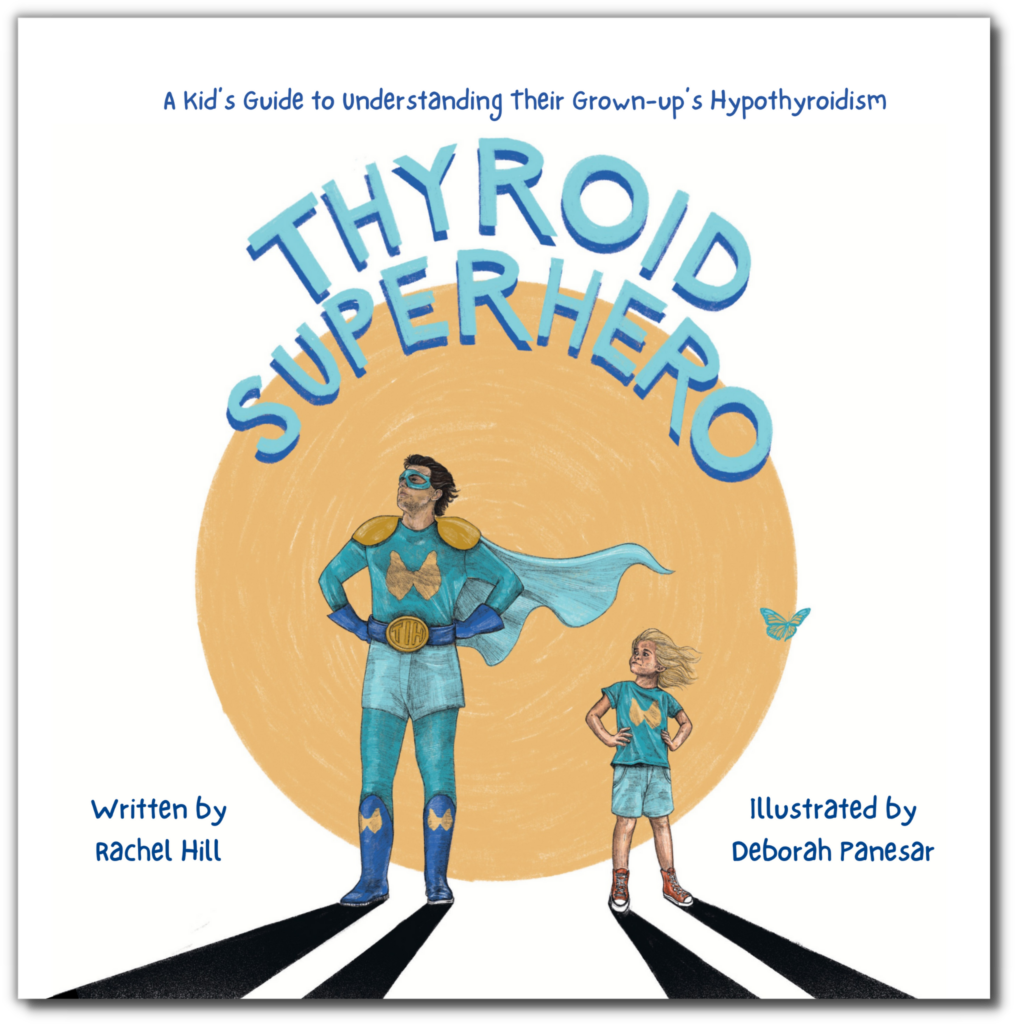
***
The book on thyroid disease and pregnancy: Your Healthy Pregnancy with Thyroid Disease: A Guide to Fertility, Pregnancy, and Postpartum Wellness
References:
[1] https://www.ncbi.nlm.nih.gov/pubmed/3066320
[2] https://www.ncbi.nlm.nih.gov/pubmed/31808375
[3] https://www.healio.com/endocrinology/thyroid/news/online/%7B261992c4-bf53-4119-bb4b-9d554a7671d1%7D/thyroid-function-antibody-positivity-associated-with-ovarian-reserve-in-infertility

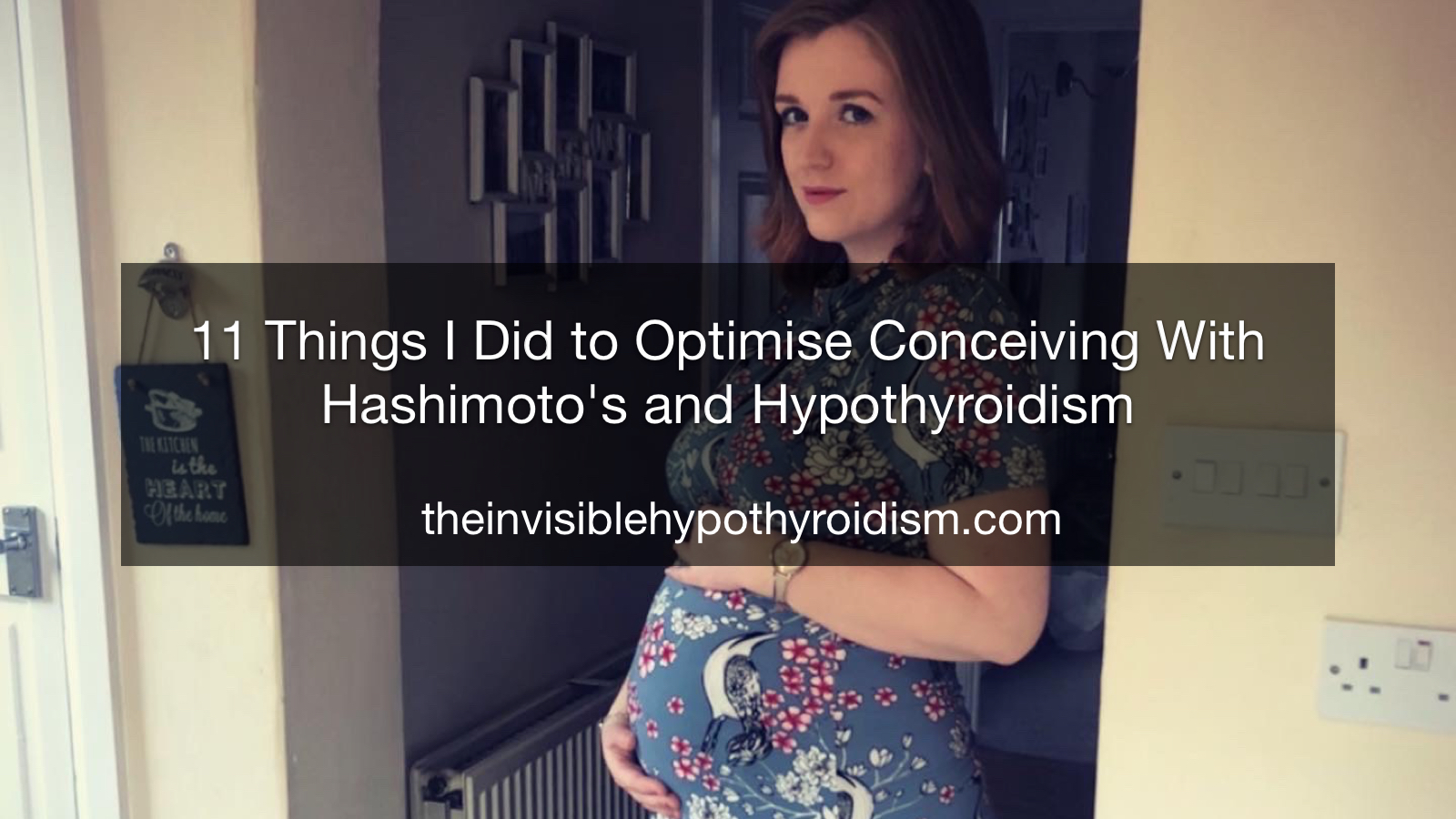



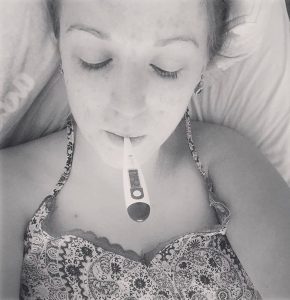



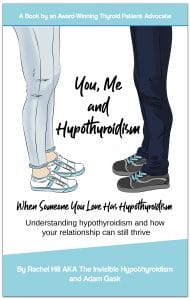 See also:
See also: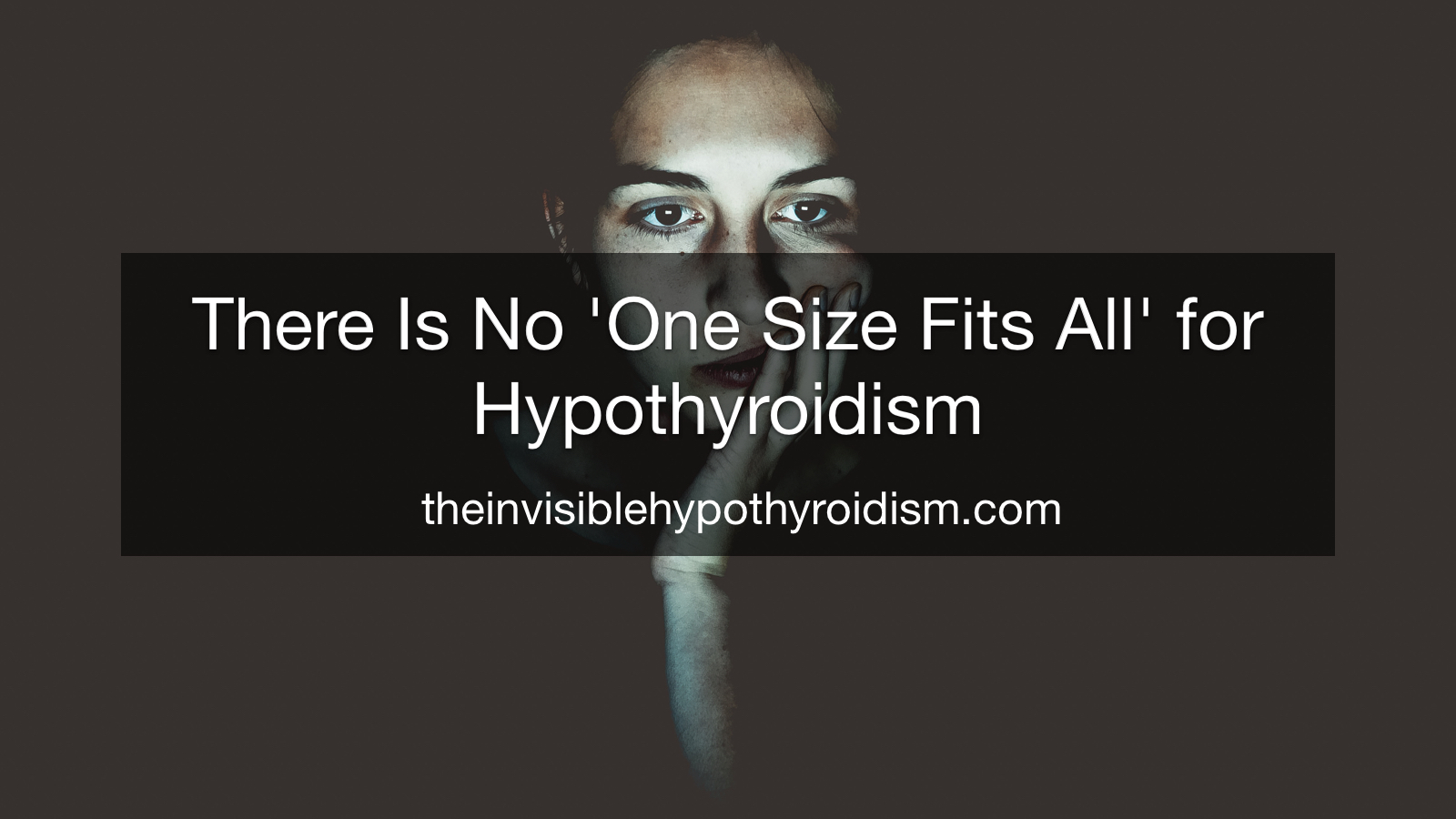



2 Comments
soso
December 31, 2022 at 2:29 pmHello! I am suffering from seconfary infertility. I have Hashimoto amd this seems to be the main issue while trying to become pregnant again. Your story is very inspiring…I am really curious if only doing things listed by you increase chances of pregnancy…of course, under a GP guidance.
Janakky raju
September 12, 2021 at 7:38 pmMy liver enzymes are fluctuating .. I was on75 mcg euthyrox and now reduced to 50 mcg . My blood test is scheduled for the 17 th .
My question is related to liver function and hypothyroidism